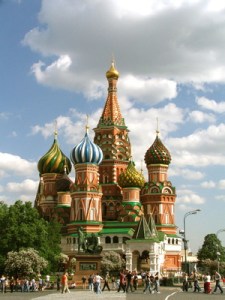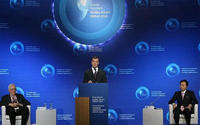 A few months ago, I wrote about why I believed that Russia’s planned “science city” was destined for failure, in my BusinessWeek column. I predicted that it would follow the path of the hundreds of cluster development projects before it. Political leaders would hold press conferences to claim credit for advancing science and technology; management consultants would earn hefty fees; real-estate barons would reap fortunes; and as always happens, taxpayers would be left holding the bag. You don’t read about the failures of tech clusters all over the world, in countries like Japan, Egypt, Malaysia, and in many regions of the United States. That’s because they die slow, silent deaths. And that is the way nearly all government-sponsored innovation efforts go.
A few months ago, I wrote about why I believed that Russia’s planned “science city” was destined for failure, in my BusinessWeek column. I predicted that it would follow the path of the hundreds of cluster development projects before it. Political leaders would hold press conferences to claim credit for advancing science and technology; management consultants would earn hefty fees; real-estate barons would reap fortunes; and as always happens, taxpayers would be left holding the bag. You don’t read about the failures of tech clusters all over the world, in countries like Japan, Egypt, Malaysia, and in many regions of the United States. That’s because they die slow, silent deaths. And that is the way nearly all government-sponsored innovation efforts go.
Given my scathing criticism, I had expected the Russian Federation to declare me persona non grata. Instead, I got an urgent call from Ellis Rubinstein, president of the New York Academy of Sciences. He said that the Honorable Ilya Ponomarev, head of the high-tech subcommittee of the Russian State Duma (Russia’s parliament) had asked the academy to prepare a detailed report on this subject. And they wanted my input. Ellis also asked whether I would accompany his team to Russia to discuss the issue. I wasn’t sure if this was an elaborate scheme to have me locked up in a Russian gulag, but I hold Ellis in such high regard that I agreed.
The Academy prepared an excellent report that explained how Israel, Finland, Taiwan, India, and the United States achieved success in building their technology industries. The report also made high-level recommendations on how Russia could achieve similar success. Earlier this week, I accompanied the authors of the report to Yaroslavl, Russia, to an event called the Global Policy Forum. This event, billed as the “Russian Davos”, was hosted by President Medvedev himself.
To my relief, the Russians didn’t have a dark cell in a labor camp waiting for me. But they did spring a terrifying surprise: at the last minute, Ponomarev asked me to give a talk—in the plenary session—on how Russia can build a Silicon Valley.  The 500+ attendees included seven heads of state (including Silvio Berlusconi of Italy and Lee Myung-bak of Korea), two former Presidents, several finance ministers, some Russian Governors and Duma members, and, from the U.S., our Chief Technology Officer and our Ambassador to Russia. If that weren’t enough, they told me that the session was being broadcast live on two TV stations. And seated directly behind the podium where I was to deliver the speech were Presidents Mbeki of South Africa and Abdul Kalam of India, and a former vice-premier of China.
The 500+ attendees included seven heads of state (including Silvio Berlusconi of Italy and Lee Myung-bak of Korea), two former Presidents, several finance ministers, some Russian Governors and Duma members, and, from the U.S., our Chief Technology Officer and our Ambassador to Russia. If that weren’t enough, they told me that the session was being broadcast live on two TV stations. And seated directly behind the podium where I was to deliver the speech were Presidents Mbeki of South Africa and Abdul Kalam of India, and a former vice-premier of China.
I started my talk by stating, quite bluntly, that I don’t believe that there is any way that Russia will ever be able to build a Silicon Valley: it lacks the requisite networks and culture of entrepreneurship, risk-taking, and openness. But Russia isn’t alone—even Boston’s Route 128, which was once a rival to Silicon Valley, lacked these ingredients and so bit the dust. And no other region in the world has been able to replicate Silicon Valley’s success.
Is there hope for Russia to build a different type of innovation/R&D hub? Yes, definitely. But Russia will need to start leveraging its own strengths to build a unique capability. It is home to some of the best engineers and scientists in the world. Unlike in the U.S., where they are called geeks and nerds, in Russia engineers and scientists are often considered national heroes. And Russian parents still encourage their children to study mathematics and science. That’s why Russians routinely win global science and engineering contests such as the recent challenge that NASA posted on Innocentive.
I know from my own experience the quality of Russian engineering talent. In 1991, right after the collapse of the Soviet Union, I hired 48 engineers in St. Petersburg and Novosibirsk, to help solve a problem that the most expensive consultants on Wall Street couldn’t—to reengineer legacy systems. The Russians were creative, able to think outside the box, and willing to challenge authority—the key characteristics needed to achieve innovation (read this piece for details of how I built a technology company based on Russian-designed technology).
But Russia has many challenges. Foreign investors are discouraged by rules of law that fail to match countries such as the U.S. and Western Europe; bureaucracies are confusing and cumbersome; corruption is rampant and is even seeping into the education system; powerful oligarchs dominate key industries; and secrecy in R&D is the norm. Until these problems are fixed, tech entrepreneurship simply can’t flourish.
Even when these problems are fixed, building a science park and adding some venture capital won’t lead to innovation. A lot more is needed. Here is my advice to Russia:
- Teach entrepreneurship, not just to university students, but also to experienced workers. Like their American counterparts, Russian entrepreneurs primarily come from the workforce: they have ideas for technologies that can be built, and when they get tired of working for others and want to build wealth, they develop the motivation to start companies. What stop them is the lack of knowledge on how to do it and fear of failure. Programs like Kauffman Foundation’s Fasttrac can teach the fundamentals of starting companies.
- Have President Medvedev provide a vision for the grand challenges that Russian society faces and ask entrepreneurs to help solve them. Let the entrepreneurs know that they should expect to fail at least two or three times before they achieve success; or very simply: that it’s okay to fail.
- Open the doors. From 1995 to 2005, 52% of Silicon Valley tech companies were founded by immigrants. These foreign-born workers brought diversity and new ideas with them. They caused Americans to work harder and think smarter. And they helped give the U.S. its huge global advantage. But because of flawed immigration policies, future generations of entrepreneurs are now leaving the U.S. in droves. Take a page from Chile’s book—invite them over and offer some incentives. Russia doesn’t have the proximity to the U.S. or the climate advantage that Chile does, so this will be harder. But it may be able to attract some of the graduating students and skilled workers who are returning to Eastern Europe and South Asia.
- Take advantage of the Patent-Free Zone. Over previous decades, very few western companies have bothered to file patents in Russia or in the other countries whose economies are now growing rapidly. As I explained in this piece, there is a huge opportunity to freely use the wealth of proven intellectual property that has already been created. Russian engineers and scientists can be solving problems for most of the world—in fields such as solar power; electric cars; mobile technologies for the poor; disease eradication; medical devices; and food processing. They can combine all sorts of technologies to produce solutions that patent restrictions prevent from being easily being created in the U.S. Any breakthroughs will ultimately benefit the patent owners when licenses are obtained for use in the West.
- Connect Russia’s engineers with their counterparts in the U.S. The Russian government should create the resources needed for American tech companies to find and hire the right Russian talent. It may even want to subsidize salaries for the first year or set up a fund that invests in Silicon Valley startups that hire Russians. This is a win—win: American startups here get desperately needed seed funding and talent, and Russians gain experience and knowledge of markets and establish valuable contacts.
- Invest in capacity-building networks such as those being developed by The New York Academy of Sciences. The academy has created an alliance of research universities and academic medical centers which are linked to industry. It has enrolled more than 6000 doctoral students and post-docs and built about 25 multi-institutional communities of researchers and students in multi-disciplinary fields. These could be linked to similar Russian networks.
Imagine the good that can come from stronger ties between the engineers and scientists of all nations: new innovations, solutions to world problems, and more jobs and economic growth.
Editor’s note: Guest writer Vivek Wadhwa  is an entrepreneur turned academic. He is a Visiting Scholar at the School of Information at UC-Berkeley, Senior Research Associate at Harvard Law School and Director of Research at the Center for Entrepreneurship and Research Commercialization at Duke University. You can follow him on Twitter at @vwadhwa
is an entrepreneur turned academic. He is a Visiting Scholar at the School of Information at UC-Berkeley, Senior Research Associate at Harvard Law School and Director of Research at the Center for Entrepreneurship and Research Commercialization at Duke University. You can follow him on Twitter at @vwadhwa and find his research at www.wadhwa.com
and find his research at www.wadhwa.com .
.